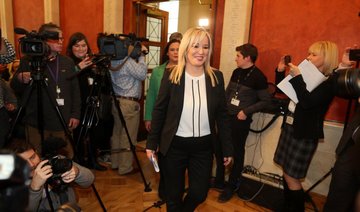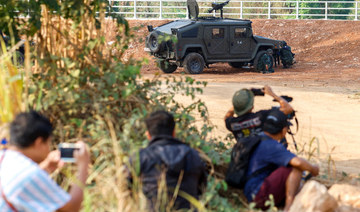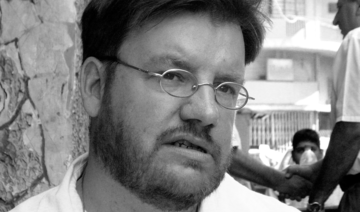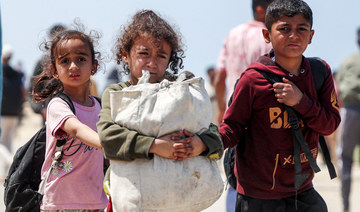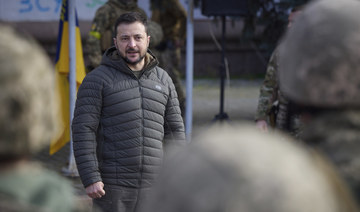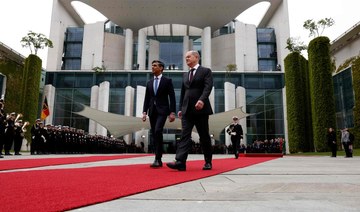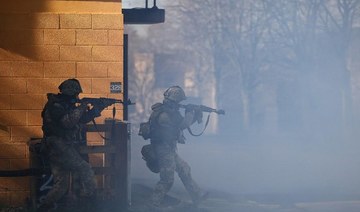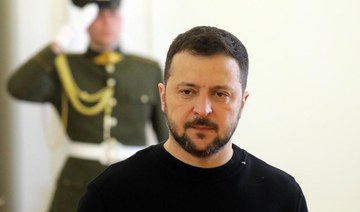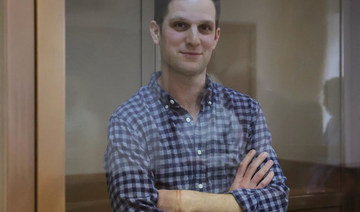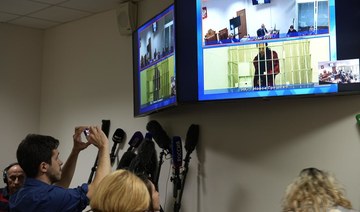LONDON: John Hume, the visionary politician who won a Nobel Peace Prize for fashioning the agreement that ended violence in his native Northern Ireland, has died at 83, his family said Monday.
The Catholic leader of the moderate Social Democratic and Labour Party, Hume was seen as the principal architect of Northern Ireland’s 1998 peace agreement. He shared the prize later that year with the Protestant leader of the Ulster Unionist Party, David Trimble, for their efforts to end the sectarian violence that plagued the region for three decades and left more than 3,500 people dead.
“I want to see Ireland as an example to men and women everywhere of what can be achieved by living for ideals, rather than fighting for them, and by viewing each and every person as worthy of respect and honor,” he said in 1998. “I want to see an Ireland of partnership, where we wage war on want and poverty, where we reach out to the marginalized and dispossessed, where we build together a future that can be as great as our dreams allow.”
Hume died Monday morning after suffering from ill health for several years, his family said.
Born on Jan. 18, 1937, in Northern Ireland’s second city — Londonderry to British Unionists, Derry to Irish nationalists — Hume trained for the priesthood before becoming a fixture on Northern Ireland’s political landscape. An advocate of nonviolence, he fought for equal rights in what was then a Protestant-ruled state, but he condemned the Irish Republican Army because of his certainty that no injustice was worth a human life.
Although he advocated for a united Ireland, Hume believed change could not come to Northern Ireland without the consent of its Protestant majority. He also realized that better relations needed to be forged between Northern Ireland and the Republic of Ireland and between London and Dublin.
He championed the notion of extending self-government to Northern Ireland with power divided among the groups forming it.
“Ireland is not a romantic dream; it is not a flag; it is 4.5 million people divided into two powerful traditions,″ he said. “The solution will be found not on the basis of victory for either, but on the basis of agreement and a partnership between both. The real division of Ireland is not a line drawn on the map, but in the minds and hearts of its people.”
While both Hume and Trimble credited the people of Northern Ireland and the Irish Republic for approving a referendum that led to power sharing, it was Hume’s diplomacy that offered the impetus to the peace process that led to the 1998 Good Friday accord.
Hume won the breakthrough in Belfast’s political landscape in 1993 by courting Gerry Adams, the head of Sinn Fein, the political wing of the Irish Republican Army, in hopes of securing an IRA cease-fire. That dialogue burnished Adams’ international credibility and led to two IRA cease-fires in 1994 and 1997.
Like most Protestant politicians at the time, Trimble had opposed efforts to share power with Catholics as something that would jeopardize Northern Ireland’s union with Britain. He at first refused to speak directly with Adams, insisting that IRA commanders needed to prove they were willing to abandon violence.
He ultimately relented and became pivotal in peacemaking efforts.
Hume had envisioned a broad agenda for the discussions, arguing they must be driven by close cooperation between the British and Irish governments. The process was overseen by neutral figures like US mediator George Mitchell, with the decisions overwhelmingly ratified by public referendums in both parts of Ireland.
“Without John Hume, there would not have been a peace process,” Mitchell said at the time the prize was announced. ”Without David Trimble, there would not have been a peace agreement.”
Hume and Trimble were said to have had a frosty relationship. But Trimble on Monday described a thawing after the Nobel ceremony in Oslo, recalling that the hotel at which they were staying had suggested the two men chose to relax away from each other.
“We didn’t do that. We relaxed and in some sense celebrated the occasion jointly, and that for me spelt out the principle for how we were going to proceed in the years after that,” he told the BBC.
Tributes poured in after’s Hume’s death was announced, including praise from Adams, who called him a “giant in Irish politics.” Former Prime Minister Tony Blair, who was in office at the time the accord was signed, lauded Hume’s “epic” contribution to the peace process.
Former US President Bill Clinton and former Secretary of State Hillary Clinton issued a statement describing their sadness.
“Through his faith in principled compromise, and his ability to see his adversaries as human beings, John helped forge the peace that has held to this day,” they said.
UK Prime Minister Boris Johnson said the Northern Ireland of today is Hume’s legacy.
“He stood proudly in the tradition that was totally opposed to violence and committed to pursuing his objectives by exclusively peaceful and democratic means,” Johnson said on Twitter. “His vision paved the way for the stability, positivity and dynamism of the Northern Ireland of today and his passing is a powerful reminder of how far Northern Ireland has come.”
Hume’s family said his funeral would be in keeping with strict guidelines on attendees because of the COVID-19 pandemic. A memorial will be arranged later.
“We are grateful for your condolences and support, and we appreciate that you will respect the family’s right to privacy at this time of great loss,” the family said in a statement. “It seems particularly apt for these strange and fearful days to remember the phrase that gave hope to John and so many of us through dark times: ‘We shall overcome.’”
John Hume, who worked to end N. Ireland violence, dies at 83
https://arab.news/vdj9x
John Hume, who worked to end N. Ireland violence, dies at 83

- Although he advocated for a united Ireland, Hume believed change could not come to Northern Ireland without the consent of its Protestant majority
- John Hume: I want to see Ireland as an example to men and women everywhere of what can be achieved by living for ideals, rather than fighting for them
Myanmar rebel group withdraws troops from key town on Thai border
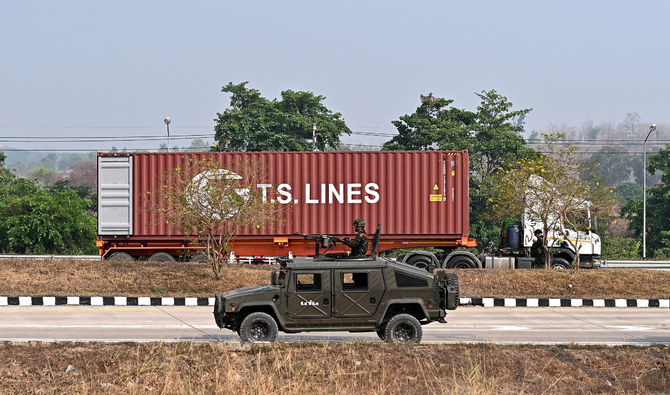
MYANMAR: A Myanmar rebel group has withdrawn its troops from a town along the Thai border following a counteroffensive by soldiers of the ruling junta from whom the resistance fighters had wrested the key trading post this month, an official said on Wednesday.
The Karen National Union made a “temporary retreat” from the town of Myawaddy, a spokesperson said, after the return of junta soldiers to the vital strategic area that is a conduit for annual foreign trade of more than $1 billion.
“KNLA troops will ... destroy the junta troops and their back-up troops who marched to Myawaddy,” said Saw Taw Nee, referring to the group’s armed wing, the Karen National Liberation Army, one of Myanmar’s oldest ethnic fighting forces.
He did not say what its next move would be, however.
Fighting had flared as recently as Saturday in Myawaddy, forcing 3,000 civilians to flee in a single day as rebels fought to flush out stranded Myanmar government troops holed up at a border bridge crossing.
On Wednesday, Thailand said the fighting had eased and it hoped to re-open its border crossing as trade had been hit. It said most civilians had returned and 650 remained.
“The situation has improved significantly,” spokesperson Nikorndej Balankura told a briefing. “Nevertheless, we are closely monitoring the situation, which is highly uncertain and can change.”
Thailand has received reports that negotiations may be starting between rival groups on the Myanmar side, Nikorndej said, without elaborating.
He added that Thailand had proposed to Laos, the chair of the Association of Southeast Asian Nations, that it could host a meeting seeking to end the Myanmar crisis.
Columbia University extends talks with students, averting police action
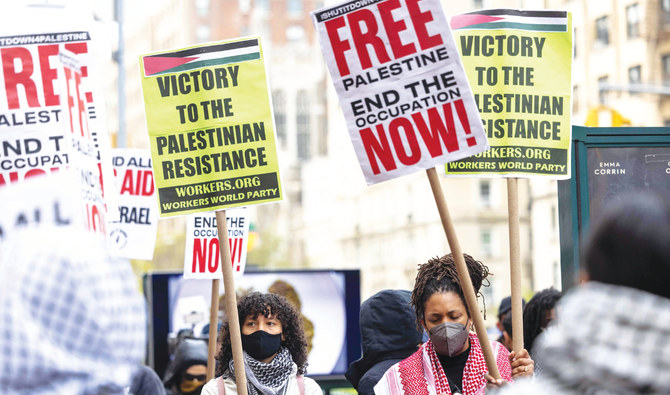
- Standoffs persist at other universities across US, including California State Polytechnic, Humboldt
NEW YORK/JERUSALEM: Columbia University averted another confrontation between students and police on Wednesday, but the situation remained tense with campus officials saying it would continue talks with pro-Palestinian protesters for another 48 hours.
University President Minouche Shafik had set a midnight deadline to reach an agreement on clearing an encampment of protesters on campus but the school extended negotiations, saying it was making “important progress.”
Student protesters had committed to dismantling and removing a significant number of tents, the New York Ivy League university said in a statement.
On Wednesday morning, the encampment appeared calm and a little smaller than the previous day.
Standoffs also persisted at other universities across the country, including California State Polytechnic University, Humboldt, where protesters this week used furniture, tents, chains and zip ties to block a building’s entrance and barricade themselves inside.
And new student encampments continued to pop up, including at Brown University in Rhode Island.
Police first tried to clear the encampment at Columbia last week, when they arrested more than 100 protesters. But the move backfired, acting as an inspiration for other students across the country to set up similar encampments and motivating protesters at Columbia to regroup.
Students protesting Israel’s war with Hamas are demanding schools cut financial ties to Israel and divest from companies enabling its monthslong conflict.
Dozens have been arrested on charges of trespassing or disorderly conduct. Some Jewish students say the protests have veered into antisemitism and made them afraid to set foot on campus.
The reprieve at Columbia came hours before Republican US House Speaker Mike Johnson planned to visit and meet with Jewish students to address antisemitism on college campuses.
Columbia said it had agreed with protest representatives that only students would remain at the encampment and they would make it welcoming, banning discriminatory or harassing language.
Elsewhere, at the University of Minnesota, Democratic US Rep. Ilhan Omar attended a protest late on Tuesday, hours after nine protesters were arrested on the campus when police took down an encampment in front of the library.
Hundreds had rallied in the afternoon to demand their release.
Omar’s daughter was among the demonstrators arrested at Columbia last week.
Also on Tuesday, police arrested more than 200 protesters blocking traffic in Brooklyn, near the home of Sen. Chuck Schumer, during a non-college demonstration demanding a permanent ceasefire in Gaza The protest was organized by Jewish Voice for Peace on the second night of Passover.
At Cal Poly Humboldt, protesters chanted, “We are not afraid of you!” before officers in riot gear pushed into them at the building’s entrance, video shows.
Three students were arrested, according to a statement from the school, which shut down the campus through Wednesday. Students had occupied a second campus building Tuesday.
Students at some protests were hiding their identities. At an encampment of about 40 tents at the heart of the University of Michigan’s campus in Ann Arbor, almost every student wore a mask, which was handed to them when they entered.
At New York University this week, police said 133 protesters were taken into custody and all had been released with summonses to appear in court on disorderly conduct charges.
More than 40 protesters were arrested Monday at an encampment at Yale University.
Harvard University in Massachusetts has tried to stay a step ahead of protests by locking most gates into its famous Harvard Yard and limiting access to those with school identification.
Meanwhile, Hamas published a video apparently showing Hersh Goldberg-Polin, an Israeli-American seized during the Oct. 7 attack on Israel and taken hostage into Gaza, alive.
The short video, which is undated, showed the 23 year-old missing his lower arm, which was blown off during the Hamas-led attack in October, but otherwise apparently healthy.
His mother Rachel Goldberg-Polin has been campaigning actively for the release of her son, who was abducted at the Nova music festival that was attacked by Hamas gunmen on Oct. 7 and is one of 133 Israeli hostages still in captivity after over 100 were freed.
Ukraine uses long-range missiles secretly provided by US to hit Russian-held areas, officials say
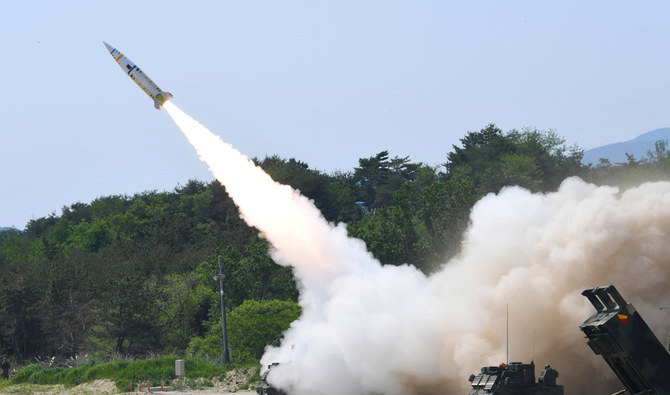
- The new missiles give Ukraine nearly double the striking distance up to 300 kilometers
- The two US officials would not provide the exact number of missiles given last month or in the latest aid package, which totals about $1 billion
WASHINGTON: Ukraine for the first time has begun using long-range ballistic missiles provided secretly by the United States, bombing a Russian military airfield in Crimea last week and Russian forces in another occupied area overnight, American officials said Wednesday.
Long sought by Ukrainian leaders, the new missiles give Ukraine nearly double the striking distance — up to 300 kilometers (190 miles) — that it had with the mid-range version of the weapon that it received from the US last October. One of the officials said the US is providing more of these missiles in a new military aid package signed by President Joe Biden on Wednesday.
Biden approved delivery of the long-range Army Tactical Missile System, known as ATACMS, in February, and then in March the US included a “significant” number of them in a $300 million aid package announced, one official said.
The two US officials, who spoke on condition of anonymity to discuss the delivery before it became public, would not provide the exact number of missiles given last month or in the latest aid package, which totals about $1 billion.
Ukraine has been forced to ration its weapons and is facing increasing Russian attacks. Ukraine had been begging for the long-range system because the missiles provide a critical ability to strike Russian targets that are farther away, allowing Ukrainian forces to stay safely out of range.
Information about the delivery was kept so quiet that lawmakers and others in recent days have been demanding that the US send the weapons — not knowing they were already in Ukraine.
For months, the US resisted sending Ukraine the long-range missiles out of concern that Kyiv could use them to hit deep into Russian territory, enraging Moscow and escalating the conflict. That was a key reason the administration sent the mid-range version, with a range of about 160 kilometers (roughly 100 miles), in October instead.
Adm. Christopher Grady, vice chairman of the Joint Chiefs of Staff, said Wednesday that the White House and military planners looked carefully at the risks of providing long-range fires to Ukraine and determined that the time was right to provide them now.
He told The Associated Press in an interview that long-range weapons will help Ukraine take out Russian logistics nodes and troop concentrations that are not on the front lines. Grady declined to identify what specific weapons were being provided but said they will be “very disruptive if used properly, and I’m confident they will be.”
Like many of the other sophisticated weapons systems provided to Ukraine, the administration weighed whether their use would risk further escalating the conflict. The administration is continuing to make clear that the weapons cannot be used to hit targets in Russia — only those inside Ukrainian territory, according to one of the US officials.
“I think the time is right, and the boss (Biden) made the decision the time is right to provide these based on where the fight is right now,” Grady said Wednesday. “I think it was a very well considered decision, and we really wrung it out — but again, any time you introduce a new system, any change — into a battlefield, you have to think through the escalatory nature of it.”
Ukrainian officials haven’t publicly acknowledged the receipt or use of long-range ATACMS. But in thanking Congress for passing the new aid bill Tuesday, Ukrainian President Volodymyr Zelensky noted on the social platform X that “Ukraine’s long-range capabilities, artillery and air defense are extremely important tools for the quick restoration of a just peace.”
One of the US officials said the Biden administration warned Russia last year that if Moscow acquired and used long-range ballistic missiles in Ukraine, Washington would provide the same capability to Kyiv.
Russia got some of those weapons from North Korea and has used them on the battlefield in Ukraine, said the official, prompting the Biden administration to greenlight the new long-range missiles.
The US had refused to confirm that the long-range missiles were given to Ukraine until they were actually used on the battlefield and Kyiv leaders approved the public release. One official said the weapons were used early last week to strike the airfield in Dzhankoi, a city in Crimea, a peninsula that Russia seized from Ukraine in 2014. They were used again overnight east of the occupied city of Berdyansk.
Videos on social media last week showed the explosions at the military airfield, but officials at the time would not confirm it was the ATACMS.
Ukraine’s first use of the weapon came as political gridlock in Congress had delayed approval of a $95 billion foreign aid package for months, including funding for Ukraine, Israel and other allies. Facing acute shortages of artillery and air defense systems, Ukraine has been rationing its munitions as US funding was delayed.
With the war now in its third year, Russia used the delay in US weapons deliveries and its own edge in firepower and personnel to step up attacks across eastern Ukraine. It has increasingly used satellite-guided gliding bombs — dropped from planes from a safe distance — to pummel Ukrainian forces beset by a shortage of troops and ammunition.
The mid-range missiles provided last year, and some of the long-range ones sent more recently, carry cluster munitions that open in the air when fired, releasing hundreds of bomblets rather than a single warhead. Others sent recently have a single warhead.
One critical factor in the March decision to send the weapons was the US Army’s ability to begin replacing the older ATACMS. The Army is now buying the Precision Strike Missile, so is more comfortable taking ATACMS off the shelves to provide to Ukraine, the official said.
Anger among Ukrainians in Poland as Kyiv halts passport renewals

- “Staying abroad does not relieve a citizen of his or her duties to the homeland,” Kuleba posted on social media
- The agency issuing passports to Ukrainian residents in Warsaw blamed a “technical error” for the problems, not the new directive from Kyiv
WARSAW: Hundreds of Ukrainians crammed up against a closed passport office in Warsaw on Wednesday, furious over Kyiv’s suspension of consular services for fighting-aged men in a bid to force them to return home and bolster troop numbers.
Ukrainian authorities said Tuesday that they were “temporarily” blocking men aged 18 to 60 from accessing consular services, after Foreign Minister Dmytro Kuleba said they were letting compatriots fight in their place on the front lines.
“Staying abroad does not relieve a citizen of his or her duties to the homeland,” Kuleba posted on social media.
The move is seen as part of Kyiv’s efforts to reinforce its army as soldiers struggle to hold positions against Russia.
But in Poland, which hosts hundreds of thousands of Ukrainians — both refugees from the conflict and those who were already living in the country when Russia invaded — there was anger among those who felt they were being unfairly targeted.
“This is a fight against people who are fleeing the army,” said Maksym, a 38-year-old truck driver, one of dozens of people who had come hoping to collect a new passport they had applied for — so far unsuccessfully.
“We are not asked on what grounds we went abroad... Why am I a draft dodger if I went abroad legally?” he told AFP.
Some said they had spent the whole night queueing up.
The agency issuing passports to Ukrainian residents in Warsaw blamed a “technical error” for the problems, not the new directive from Kyiv.
A heated argument broke out at the passport office when women accused a group of men of blocking the entrance and stopping other people who wanted to submit applications.
Pavlo Lyashenko, a 35-year-old entrepreneur standing nearby as the scene unfolded, told AFP that “The state has put me in a situation in which I have no way out.”
He said he had received a text message saying his passport was ready, but believed it was now being withheld from him.
“The doors are blocked. They are afraid that if I come inside, I will not leave until I receive my passport. I know it’s there,” Lyashenko said.
As the crowds swelled through the morning, the agency called in the Polish police as a precaution. Officers spoke with those queueing up, but did not otherwise intervene.
Diana Petrenko, deputy director of the Warsaw passport office, insisted that technical issues were to blame.
“Unfortunately, the documents are not issued due to technical reasons,” she told AFP, refusing to elaborate on the nature of the alleged glitch.
Ukraine’s foreign ministry said Tuesday that the suspension applied only to new applications and that any requests submitted before then would be honored.
Lyashenko, the entrepreneur, who said he had left Ukraine long before the start of the war, said he worried he could end up in a legal grey zone, abroad but without a valid passport.
“I think that our state is simply driving people to the point that we will all need to do this,” he said.
Although there are some exceptions, most Ukrainian men have been barred from leaving the country since Russia invaded in February 2022 — meaning that many who will now be unable to submit new passport applications had already been living away for years.
According to Ukrainian media, hundreds of thousands of working-age men have sought refuge in EU countries since the start of the war.
The consular service suspensions, which come as Kyiv scrambles to recruit troops, is widely seen as an attempt to force fighting-age men back to Ukraine.
President Volodymyr Zelensky’s government also recently passed a new mobilization law designed to help lift army numbers, and lowered the age limit for mobilization to 25 from 27.
The mobilization law, due to come into force mid-May, also toughens penalties against draft dodgers and forces men to keep their military registration up to date.
The foreign ministry said the suspension of consular services was a temporary measure needed to “resolve technical issues” linked with the implementation of the new law.
Bogdan, a Ukrainian truck driver who declined to give his full name, said he was stuck waiting for a second day straight at the Warsaw passport office.
“I drove 700 kilometers (435 miles) to get my passport because I received a text message that I could pick it up,” the 27-year-old said.
“No one gives the passport. What are our next steps?” he said. “What do we have to do to simply be given our documents that we paid for?“
A Russian deputy defense minister is ordered jailed pending trial on bribery charges
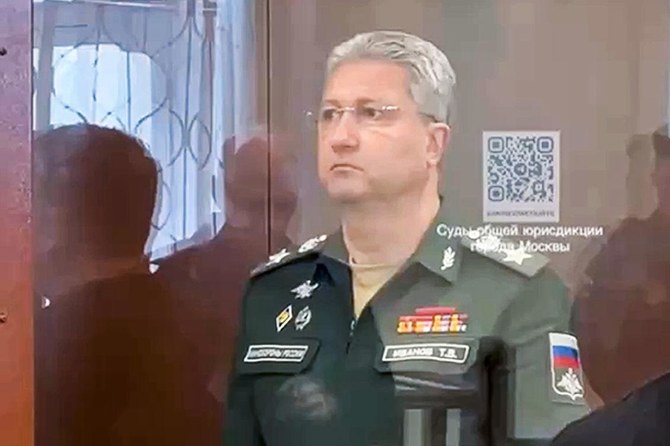
- Timur Ivanov, one of 12 deputy defense ministers, appeared in Moscow’s Basmany court Wednesday wearing his military uniform
- The committee gave no further information, apart from saying Ivanov is suspected of taking an especially large bribe — an offense punishable by up to 15 years in prison
MOSCOW: A Russian deputy defense minister in charge of military construction projects and accused of living a lavish lifestyle was ordered jailed Wednesday pending an investigation and trial on charges of bribery, court officials said in a statement.
Timur Ivanov, one of 12 deputy defense ministers, appeared in Moscow’s Basmany court Wednesday wearing his military uniform. The ally of Defense Minister Sergei Shoigu was arrested Tuesday evening, Russia’s Investigative Committee said in a statement.
The committee gave no further information, apart from saying Ivanov is suspected of taking an especially large bribe — an offense punishable by up to 15 years in prison.
The Kremlin rejected some Russian media reports that Ivanov was suspected of treason.
Ivanov, 48, was sanctioned by both the United States and European Union in 2022 after Russia’s full-scale invasion of Ukraine.
According to a court statement, investigators told the judge that Ivanov had conspired with third parties to receive a bribe in the form of unspecified property services “during contracting and subcontracting work for the needs of the Ministry of Defense.”
An acquaintance of Ivanov’s, identified as Sergei Borodin, also was arrested and ordered jailed pending an investigation and trial on the same charges, court officials said. Both men are to remain in custody until at least June 23.
According to the Defense Ministry’s website, Ivanov was appointed in 2016 by a presidential decree. He oversaw property management, housing and medical support for the military, as well as construction projects.
Russia’s state news agency RIA Novosti quoted Kremlin spokesman Dmitry Peskov as saying that Shoigu and President Vladimir Putin were informed of Ivanov’s arrest, which comes as Moscow’s war in Ukraine grinds through its third year.
Peskov dismissed Russian media reports that the corruption allegations against Ivanov were intended to obscure additional allegations of high treason.
Independent Russian news outlet reported that the bribery charges were intended to hide more serious charges of treason and avoid scandal, citing two unidentified sources close to the Federal Security Service, or FSB.
Peskov described the reports as speculation. “There are a lot of rumors. We need to rely on official information,” he told journalists.
Ivanov’s lawyer also denied any other charges, telling RIA Novosti that he faced only bribery allegations.
Before his arrest, Ivanov was seen attending a meeting with Shoigu and other military brass.
Russian media reported that he oversaw some of the construction in Mariupol — a Ukrainian port city that was devastated by bombardment and occupied by Russian forces early in the war.
Zvezda, the official TV channel of the Russian military, reported in summer 2022 that the ministry was building an entire residential block in Mariupol and showed Ivanov inspecting construction sites and newly erected residential buildings.
That same year, the team of the late Alexei Navalny, Russia’s most prominent opposition leader and anti-corruption campaigner, alleged Ivanov and his family had been enjoying luxurious trips abroad, lavish parties and owning elite real estate. The activists also alleged that Ivanov’s wife, Svetlana, divorced him in 2022 to avoid sanctions and continued living a lavish lifestyle.
Commenting on Ivanov’s case, Navalny’s ally Maria Pevchikh said on social platform X: “It’s a good day today.”
The prosecution of high-level officials for corruption remains relatively rare in Russia.
The most recent arrest in April 2023 saw former Deputy Culture Minister Olga Yarilova charged with embezzling more than 200 million rubles ($2.2 million). Yarilova, who held her post between 2018 and 2022, is on trial and facing a seven-year jail term.
Former Economics Minister Alexei Ulyukayev received an eight-year prison sentence in 2017 for accepting a $2 million bribe from one of Putin’s top associates. The high-profile trial was widely seen as part of infighting between Kremlin clans. Ulyukayev, now 68, was granted early release from prison in May 2022.



